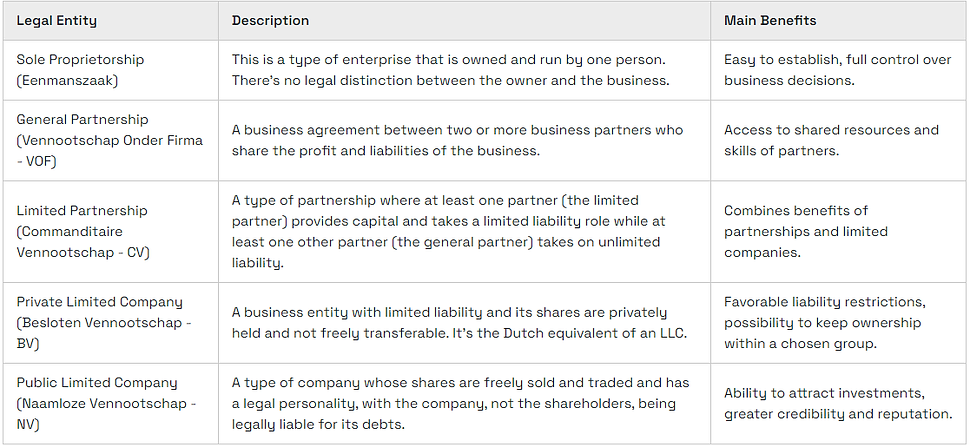Q: Can I start a business as a foreigner in Austria?
A: Yes, forming a company in Austria as a foreigner is possible. Austria offers a business-friendly environment, even for non-residents. The first step in starting a company in Austria is completing a Know Your Customer (KYC) identification process, requiring proof of identity and residence. This is essential for all company founders.
To register a business in Austria, you must visit a notary to sign the necessary documents. For non-residents, this can present logistical challenges. However, like in the Netherlands, Austria provides options for remote company formation. Through the use of trusted local agents or remote verification systems, non-residents can handle their business setup efficiently from abroad.
Austria's government does not impose restrictions on non-residents forming companies. With proper documentation and adherence to the legal procedures, foreign entrepreneurs can establish and operate businesses in Austria without discrimination. House of Companies offers guidance on how to navigate this process, ensuring a smooth setup.
Q: What are the essential steps to write a business plan for a new business in Austria?
A: Writing a business plan for a new business in Austria involves key components such as a detailed description of your business activities, market analysis, business strategy and objectives, organizational structure, marketing and sales plan, financial forecasts, and compliance with legal requirements. A comprehensive business plan is vital when registering your company with the Austrian authorities and securing financing or government support. House of Companies provides templates and personalized advice to help structure your business plan efficiently.
Q: What are the differences between a branch and a legal entity when setting up a business in Austria?
A: In Austria, a branch is an extension of an existing foreign company and is subject to the legal and tax obligations of the parent company. A legal entity, such as a GmbH (limited liability company) or an AG (public limited company), operates as an independent business with its own legal status. When choosing between a branch or a legal entity, it's important to consider the tax, legal, and administrative obligations. House of Companies offers expert consultation on the best structure for your business.
Q: What are the requirements to register a business with the Austrian Chamber of Commerce?
A: To register a business with the Austrian Chamber of Commerce (Wirtschaftskammer Österreich, WKO), you must provide proof of identity, a valid business name, business address, details of your business activities, and any required permits or licenses. Some business types may need additional documentation. House of Companies assists you in preparing all necessary documents and ensuring compliance with Austrian laws.
Q: How do I open a business bank account in Austria?
A: To open a business bank account in Austria, you will need to present proof of company registration from the Austrian Chamber of Commerce, a valid ID, and details of the business owners. Some banks may also require a local Austrian address. Virtual office services can be used to meet these address requirements, which House of Companies can facilitate.
Q: What are some key business opportunities currently available in the Austrian market?
A: Austria offers numerous business opportunities, especially in industries like technology, renewable energy, tourism, and financial services. Its central location in Europe and highly developed infrastructure make it an attractive market for new businesses. Conducting thorough market research is crucial to identifying the right opportunities, and House of Companies offers market insights to support informed decision-making.
Q: What legal requirements must be met to start a business in Austria?
A: To start a business in Austria, you must register your company with the Austrian Chamber of Commerce (WKO), obtain the necessary permits and licenses, and ensure compliance with labor laws if hiring employees. Additionally, Austrian businesses are required to maintain a local registered office. House of Companies provides support in navigating these legal requirements.
Q: What support is available for foreigners wanting to start a business in Austria?
A: Foreigners looking to start a business in Austria can access various resources, including guidance from the Austrian Chamber of Commerce, startup incubators, and government-backed initiatives. House of Companies works closely with local networks to provide ongoing support, from legal advice to administrative assistance, ensuring a smooth business launch.
Q: Can I operate a business from abroad if I register in Austria?
A: Yes, it is possible to operate a business from abroad if you register in Austria. However, you must maintain a local business address and meet Austrian legal obligations, such as tax registration. House of Companies offers virtual office services and handles regulatory compliance, allowing you to run your business remotely.
Q: What is the importance of the statutory seat requirement in Austria?
A: The statutory seat in Austria refers to the registered office of your business. This is critical for determining the legal jurisdiction and fulfilling legal obligations, such as tax filings and company administration. A business must have a registered address in Austria, and House of Companies can provide virtual office solutions to meet this requirement.
Q: What steps are involved in company formation in Austria?
A: The company formation process in Austria involves choosing a business structure (e.g., GmbH or AG), selecting a business name, registering with the Austrian Chamber of Commerce, and obtaining a tax identification number. House of Companies assists in every step, ensuring a hassle-free setup with complete legal compliance.
Q: How do I register a business with the Austrian Chamber of Commerce (WKO)?
A: To register a business with the Austrian Chamber of Commerce, you must submit your business name, proof of identity, and company details either online or in person. After submitting the required documents and paying the necessary fees, your business will be assigned a unique registration number. House of Companies provides assistance in completing the registration process.
Q: What business opportunities are available for foreigners in Austria?
A: Austria's thriving business sectors include renewable energy, IT, tourism, and pharmaceuticals. Its favorable economic policies make it an attractive destination for foreign entrepreneurs. House of Companies offers market research and guidance tailored to your business goals, helping you capitalize on these opportunities.
Q: Can I use my home address as my business address in Austria?
A: You can use your home address as your business address in Austria, provided it meets the legal requirements for company registration. This address will be used for official correspondence. House of Companies offers virtual office services for those who prefer not to use their home address.
Q: What business taxes should I be aware of in Austria?
A: In Austria, businesses are subject to corporate income tax, VAT, and payroll taxes. Ensuring compliance with these taxes is critical for smooth operations. House of Companies offers expert tax consultation services to help your business stay compliant with Austrian tax laws.
Q: What is the difference between a branch office and a subsidiary in Austria?
A: A branch office is an extension of a foreign company, whereas a subsidiary is a legally independent entity. The documentation required for registering a branch is typically simpler, but subsidiaries offer full legal separation from the parent company. House of Companies helps you determine which structure best suits your business needs.
Q: How can I start a payroll office to employ staff in Austria?
A: To start a payroll office in Austria, you must register your business with the Austrian Chamber of Commerce and ensure compliance with local tax and labor laws. House of Companies provides support in navigating the registration process and managing payroll requirements.
Q: Do I need to register my business if I am only testing the market in Austria from abroad?
A: If you are testing the market in Austria, you may still need to register a non-permanent office and obtain a VAT number. House of Companies offers guidance on regulatory compliance for foreign businesses testing the Austrian market.
Q: What legal forms of businesses can I set up in Austria as a foreigner?
A: Foreigners can establish various legal business forms in Austria, including GmbHs, AGs, branches, and sole proprietorships. Each structure has its own legal and tax requirements. House of Companies helps you choose the best option for your business and assists in the incorporation process.
This structure ensures compliance with Austrian regulations while incorporating SEO best practices. House of Companies is presented as a key facilitator in helping clients successfully navigate business formation and compliance in Austria.





